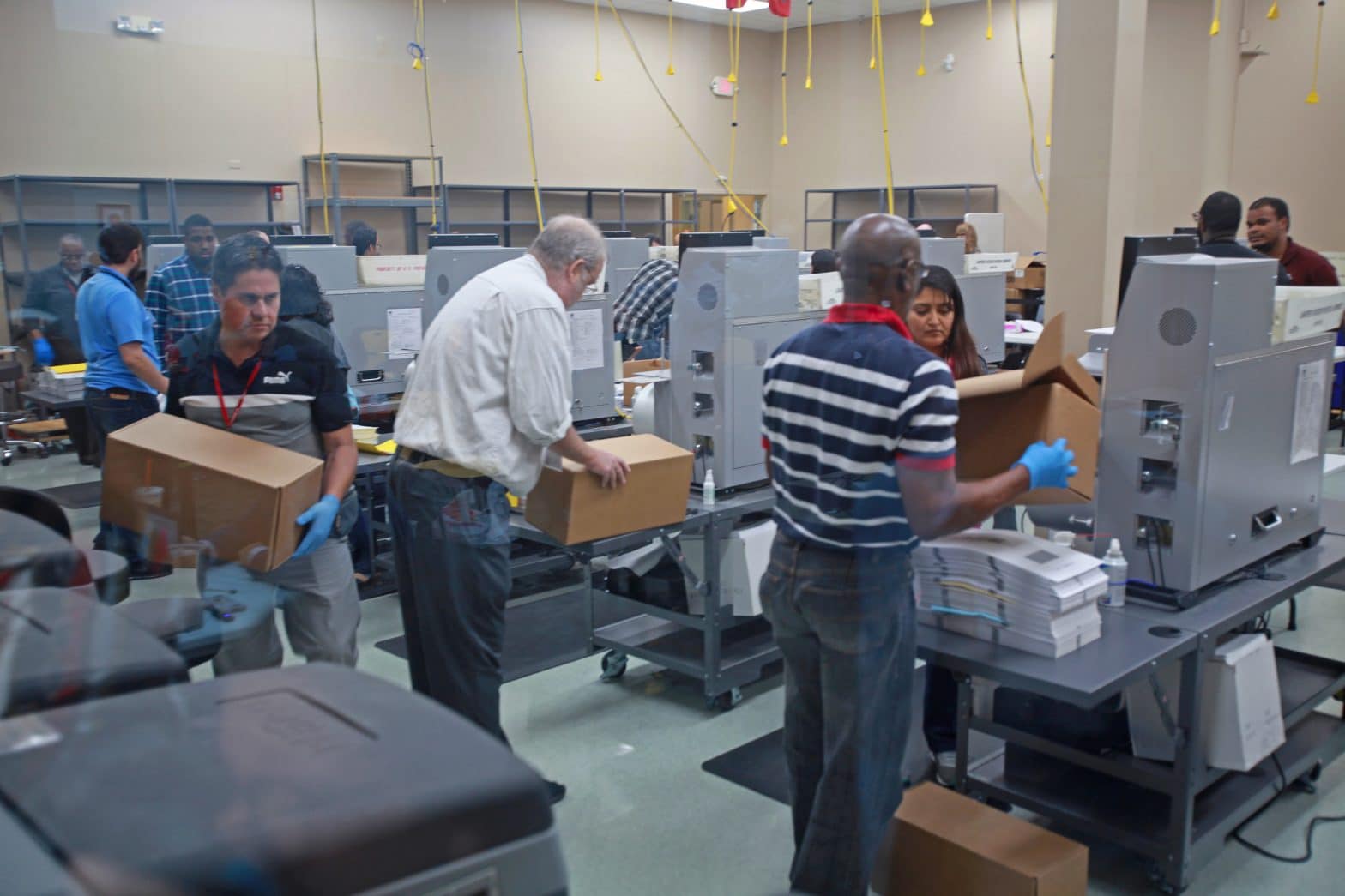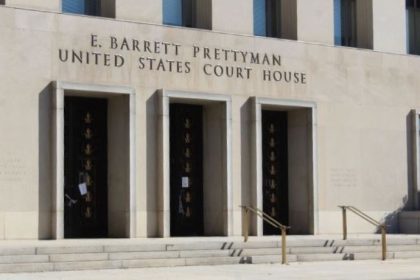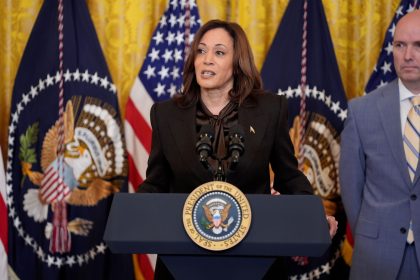Report: Voting Machines Remain Vulnerable Ahead of 2020 Election

A mere 608 days before what promises to be the most hotly-contested presidential election in a generation, aging voting machines employed in nearly every state of the union fall far short of ensuring a fair and secure Election Day, a new analysis has found.
According to the Brennan Center for Justice, which released its findings Tuesday, 45 states continue to use older voting systems that are more likely to fail and grow more difficult to maintain with each passing election.
Just as worrisome, 12 states persist in using paperless machines despite their vulnerability to cyber attacks.
“It’s essential that we prioritize fixing our election infrastructure now, ahead of the next presidential election in 2020,” said Lawrence Norden, deputy director of the Brennan Center’s Democracy Program, and author of the report.
“We face threats not only from foreign countries, but also the wear-and-tear of decades of use,” Norden said. “Election officials are largely doing what they can, but recent progress is short of what current circumstances demand.”
The report from the center, which is part of the New York University Law School, is its third deep dive into the situation since September 2015.
It was compiled in the wake of the 2018 midterm elections, in which malfunctioning voting machines were blamed for long wait-times at polls that reportedly discouraged at least some from voting.
While the analysis does note some promising developments since the Brennan Center began tracking the issue, including last year’s passage of the Help America Vote Act (HAVA) through which Congress allocated $380 million to help states bolster election security, Norden said this only scratches the surface of investments that are needed in the coming years to safeguard the nation’s elections.
And because of how the money was distributed, it will be insufficient to replace the vast majority of the most vulnerable machines before the primaries begin in February 2020, the report says.
“We are driving the same car in 2019 that we were driving in 2004, and the maintenance costs are mounting,” warned Rokey Suleman, a former elections director for Richland County, South Carolina, summing up the situation for the researchers this past winter.
Though he considered himself one of the lucky elected officials because he’d been able to lock down spare parts for the machines in his county when he needed them in the past, he said it’s “not going to keep being that way in the near future.”
He also noted that South Carolina’s systems run on software that was developed decades ago, including Windows XP. Too often, the Center said, vendors no longer write security patches for such software, leaving machines more vulnerable to cyberattacks.
That’s cause for concern among cybersecurity experts in the federal government who were pushing for concrete steps to be taken ahead to strengthen state voting systems for 2020 even before the dust settled on the midterms.
In the run-up to the elections late fall, intelligence officials warned that Russia, China and Iran, among others, were actively engaged in efforts to influence U.S. elections and said it is imperative that voting systems are updated and include a paper trail so election results are subject to a rigorous auditing process that can detect outside manipulation.
In a November interview with the Associated Press, Chris Krebs, head of cybersecurity at the Department of Homeland Security, said no one should be lulled into complacency by the relative lack of evidence of election hacking in 2018.
“The midterm is not the big game,” he said at the time. “The big game we think for the adversaries is probably 2020.”
Meanwhile, the National Academy of Sciences recently noted that machines that do not produce a printout of a voter’s selections that can be verified by the voter and used in audits – should be “removed from service as soon as possible,” to ensure the security and integrity of elections.
The Brennan Center said that in its winter survey, election officials from 254 jurisdictions in 37 states said they plan to purchase new voting equipment in the near future, and that 121 of those officials said it is extremely urgent that they do so before 2020.
The problem, they said, is they simply don’t have adequate funds to do so, even after the distribution of additional HAVA funds from Congress.
Despite the acknowledged risks, the researchers found that 12 states continue to rely solely on paperless voting machines in some of their election districts, and that of these, four – Delaware, Georgia, Louisiana and South Carolina — use them statewide, something the intelligence committees in both the U.S. Senate and House of Representatives, as well as security experts around the country, have argued is an unnecessary security risk.
Last fall, barely a month before midterm elections, voting integrity advocates and electronic voting experts pressed the federal government to issue an official warning to states that use voting machines with integrated cellular modems that the machines are vulnerable to hacks, potentially interfering with the ballot counting.
Once seen as a useful tool to provide quick election results, voting machines with cellular modems became subject to fierce debate over how easy it would be to break into them and change the results.
Such machines were certified for use in Florida, Illinois, Michigan and Wisconsin. The election went forward without the warning.
Almost all of the election officials who told the Brennan Center they planned on replacing voting equipment “soon” — including officials in 9 of the 12 states still using paperless voting today –said their hope was to find new machines that produce voter-verified paper backups that could be used in a recount or audit.
Of these, roughly half plan on purchasing optical scan machines with accessible ballot-marking devices, 13 percent plan on purchasing DREs (direct-recording electronic voting machines) with a paper trail, and 6 percent plan on purchasing ballot-marking devices only.
The rest did not specify what equipment they are planning on purchasing or are currently undecided.
“At the end of the day, we have that ballot that we can always go back to,” said Shantiel Soeder, election and compliance administrator at Ohio’s Cuyahoga County Board of Elections.
“We still find it important to print out receipts for other transactions in our lives. To have absolutely no paper, it’s almost irresponsible,” Soeder said.
But even in instances where paper backup records are created, the center found many states have no requirement that they be used in post-election audits to verify results and ensure no hack has occurred. In 2020, only two states will mandate such post-election checks.
Of the 937 election officials in 46 states who responded to a Brennan Center survey, a majority said they still lack the funds necessary to ensure adequate training of staff and IT support to carry out such efforts.
The good news, the center said, is that 25 states and the District of Columbia do conduct pre-certification audits of some kinds, and five states — California, Indiana, Michigan, Rhode Island and Virginia — have either already performed risk-limiting audits of the voting systems or plan to do so this year.






















